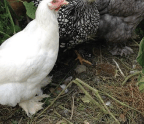New Work for Old Chickens

Back in the day, fowl fanciers and farmstead owners all over the country kept chickens because they were beautiful, particularly suited to a specific region’s environment, and for the services they could offer and/or the products they could supply.
Did you know that some fancy fowl were kept to supply the fashion and fishing-fly-tying industries with incredibly beautiful feathers, which were often harvested without ending the bird’s life? Others were kept for the eggs or meat they could provide. And all the while, the birds kept their premises free of all manner of pests, including flies, ticks, grubs, caterpillars, and even mice and snakes in some instances. Plus, chickens are an end-of-the-day entertainment that rivals the best Broadway show or blockbuster movie. You’ve heard the expression “sit and watch the chickens peck.” For the homesteader, there may be nothing quite so soothing at the end of a fulfilling day of work than to sit, cool beverage in hand, and watch the chickens just do what chickens do.
So, what is it that they do? Well, if the chickens in question happen to be one of the small handful of over-bred industrial breeds, those poor animals will have few social skills and may grow so fast and so out of proportion that they break bones or die of heart attacks just eight weeks after hatching. Watching these chickens do their thing may be more depressing than relaxing or uplifting—especially if they’re in a horrific factory-production setting—but that’s not their fault. It’s the fault of animal science’s morally questionable conclusion that
You’re reading a preview, subscribe to read more.
Start your free 30 days





